Background
Daniele Rosa was born on October 29, 1857, in Susa, Piedmont.

University of Turin, Turin, Italy
Rosa studied science and medicine at Turin, receiving the doctorate in 1880.
University of Göttingen, Göttingen, Lower Saxony, Germany
After 1880 Rosa received further training at the University of Göttingen under Ernst Ehlers at the zoology institute, as well as at the zoology museum at Turin.

https://www.amazon.com/Progressive-Variabilitat-Beziehungen-Aussterben-Entstehung/dp/1168500699/ref=sr_1_1?keywords=Die+progressive+Reduktion+der+Variabilit%C3%A4t+und+ihre+Beziehungen+zum+Aussterben+und+zur+Entstehung+der+Arten&qid=1577353550&s=books&sr=1-1
1903

https://www.amazon.com/Ologenesi-evoluzione-distribuzione-geografica-viventi/dp/B0041T57AO/ref=sr_1_1?keywords=Ologenesi%3B+Nuova+Teoria+dell%27Evoluzione+e+della+Distribuzione+Geografica+dei+Viventi&qid=1577354268&s=books&sr=1-1
1918
naturalist scientist Zoologist
Daniele Rosa was born on October 29, 1857, in Susa, Piedmont.
Rosa studied science and medicine at Turin, receiving the doctorate in 1880. After 1880 he received further training at the University of Göttingen under Ernst Ehlers at the zoology institute, as well as at the zoology museum at Turin.
After Rosa completed his training under Ernst Ehlers at the zoology institute of the University of Gottingen, then he was an assistant at the zoology museum in Turin. Later he taught zoology and comparative anatomy at the universities of Sassari, Modena, Florence, Turin, and, again, Modena. He retired in 1932.
Rosa published works on the morphology and systematics of the oligochaetes (Annelida). In two monographs that appeared in 1899 and 1918, he set forth his own theory of the origin of species and of their transformations.
Rosa's major achievement was in the development of a model of evolutionary process that was an orthogenetic one in which species were thought to change slowly on the basis of two kinds of forces: a directional ones akin to natural selection that caused modifications over time, and cladogenesis, or the splitting of one species into two. Among other things, the theory also projects that these processes are completely controlled by internal causes and that new forms will emerge at a slower rate as time goes on, eventually ceasing to be added all together.
Despite the fact that the theory contains some fairly apparent and perhaps fatal flaws, still, it periodically continues to attract interest, as certain aspects of it are backed by some evidence, and some observers have noted that its unusual perspective may have contributed to the development of vicariance biogeography and panbiogeography approaches.
Rosa held that the extinction of species results primarily from a steady decrease in variability and postulated a “law of progressively diminished variation”: the longer a species has been in existence, the less it varies. Since the lower species supposedly possessed a better-preserved capacity for variation, in the course of time they replaced the higher species. The law was concerned essentially with causes, which were unknown.
Rosa, therefore, changed its basis to what he termed a “law of progressively diminished variability.” The effect of this law was slowed, however, because not all parts of an animal become modified - and therefore reach an endpoint - simultaneously. Nevertheless, a consequence of the law was that the emergence of new forms eventually ceased. Rosa’s law also asserted the existence of orthogenesis in nature. This orthogenesis, he claimed, was not affected by individual variations, since the latter, which were “Darwinian” as opposed to “phylogenetic,” had, in his view, no influence on the transformation of species. The theory found no supporters.

